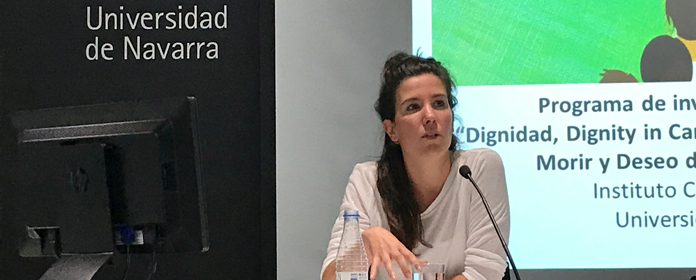Dignity in care: a way to address the dying wishes of patients with advanced illnesses
Alazne Belar explains in a colloquium on palliative care this way of caring for the patient based on respect, kindness and compassion.

PHOTO: Courtesy
How can healthcare professionals deal with the dying wishes of their patients with advanced diseases? One way of caring for the patient is dignity in care, which is listening, facilitating expression, understanding and accompanying the patient. Alazne Belar, a doctoral candidate in the ATLANTES Program of the Institute for Culture and SocietyD. student, discusses this question in the first of a series of colloquia on palliative care organized by group.
The researcher distinguishes between dignity as an intrinsic value of the person and social dignity, which depends on interaction with other people. "We have seen that depending on how we relate to people, the look, that subjective or social dignity, can be undermined," she says.
Several programs of study reveal that the deterioration brought about by the disease can lead a patient to express a wish to die. In this regard, Alazne Belar points out that wishing to die is a general wish that encompasses "from a general wish to a specific application wish to bring forward death. However, a patient may wish to die but does not consider bringing forward death, so will not take any action".
For Belar, the core topic is precisely to see what is behind that wish: "Many times it is not simply a 'wish to die', it has many implications and meanings, it can be a way of asking for a financial aid, or a way of saying that you don't want to live in that way or with that pain".
In that sense, there are different ways to proceed, from agreement with the ATLANTES doctoral candidate. If, for example, this desire were caused by pain, it could be dealt with through medication.
However, if the issue is loss of meaning in life, dignity therapy may help. This consists of having a conversation about aspects that are relevant to them and that they want to share with their loved ones, and with this information a document is drawn up.
"Many times you do not know if what financial aid is the document as bequest, the conversation ... What has been seen is that this therapy financial aid to the sense of dignity of the person and is accepted and recommended by many patients," says Alazne Belar.
The ATLANTES Program at Institute for Culture and Society is supported by Banco Santander at framework through a agreement signed with the University of Navarra.
